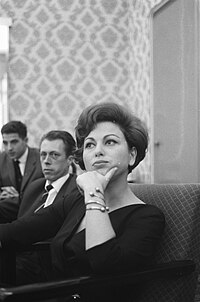This is an old revision of this page, as edited by GiantSnowman (talk | contribs) at 07:32, 28 March 2018 (Reverted edits by 109.255.104.181 (talk) to last version by Bbb23). The present address (URL) is a permanent link to this revision, which may differ significantly from the current revision.
Revision as of 07:32, 28 March 2018 by GiantSnowman (talk | contribs) (Reverted edits by 109.255.104.181 (talk) to last version by Bbb23)(diff) ← Previous revision | Latest revision (diff) | Newer revision → (diff)| Haya Harareet | |
|---|---|
| חיה הררית | |
 Harareet in 1960 Harareet in 1960 | |
| Born | Haya Neuberg (Template:Lang-he) (1931-09-20) 20 September 1931 (age 93) Haifa, Mandatory Palestine (now Israel) |
| Nationality | Israeli |
| Other names | Haya Hararit Haya Harareet-Clayton |
| Occupation | Actress |
| Years active | 1955–1974 |
| Spouse(s) | Nachman Zerwanitzer (divorced) Jack Clayton (1984–1995) (his death) |
Haya Harareet (Template:Lang-he; born 20 September 1931) is an Israeli actress, perhaps best known for playing Esther, Charlton Heston's love interest in Ben Hur (1959).
Early life
The first of three children, Harareet was born Haya Neuberg in Haifa, in what was then Mandatory Palestine (now Israel). Her parents, Reuben and Yocheved Neuberg, emigrated to Israel from Poland when they were young. Her father worked for the government in Tel Aviv. She received the surname Hararit (later changed to Harareet), which means "mountainous" in Hebrew, at school.
Career
 Preparing for a play in Israel, 1954
Preparing for a play in Israel, 1954 In the trailer for Ben-Hur (1959)
In the trailer for Ben-Hur (1959) In a press conference for Ben-Hur in Amsterdam, Netherlands, 1960
In a press conference for Ben-Hur in Amsterdam, Netherlands, 1960
She began her career in Israeli films with Hill 24 Doesn't Answer (1955), which was nominated for the Palme d'Or at the 1955 Cannes Film Festival. She played opposite Virna Lisi in Francesco Maselli's The Doll that Took the Town (1957), an Italian film. Her major role as Esther in Ben-Hur (1959) remains her most widely seen performance in international cinema. Variety, in its review of Ben-Hur, praised Harareet's performance:
Haya Harareet, an Israeli actress making her first appearance in an American film, emerges as a performer of stature. Her portrayal of Esther, the former slave and daughter of Simonides, steward of the House of Hur, is sensitive and revealing. Wyler presumably deserves considerate credit for taking a chance on an unknown. She has a striking appearance and represents a welcome departure from the standard Hollywood ingenue.
Then came 1961's L'Atlantide [fr] (Journey Beneath The Desert, aka The Lost Kingdom), directed by Edgar G. Ulmer and co-starring Jean-Louis Trintignant. She appeared opposite Stewart Granger in Basil Dearden's film The Secret Partner (1961), and she played the role of Dr. Madolyn Bruckner in The Interns (1962).
She co-wrote the screenplay for Our Mother's House (1967) from the novel of the same name by Julian Gloag.
Personal life
Harareet's first husband was Nachman Zerwanitzer, an Israeli irrigation engineer. They lived in an apartment in Tel Aviv and were divorced sometime before 1961.
Harareet's second husband was the British film director Jack Clayton. They were married in Wycombe District, Buckinghamshire, England, in 1984.
Filmography
| Year | Title | Role | Notes |
|---|---|---|---|
| 1955 | Hill 24 Doesn't Answer (Giv'a 24 Eina Ona) | Miriam Miszrahi | Israeli film |
| 1957 | The Doll That Took the Town (La donna del giorno) | Anna Grimaldi | First Italian film |
| 1959 | Ben-Hur | Esther | First American film |
| 1961 | The Secret Partner | Nicole "Nikki" Brent | British film |
| 1961 | Journey Beneath the Desert (Antinea, l'amante della città sepolta) | Queen Antinea | Italian-French co-production |
| 1962 | The Interns | Dr. Madolyn Bruckner | Second and final American film |
| 1962 | The Last Charge (La leggenda di Fra Diavolo) | Fiamma | Italian film |
| 1964 | L'ultima carica | Claudia | Italian film |
| 1974 | My Friend Jonathan | Second and final British film |
References
- Burton, Alan; O'Sullivan, Tim (2009). The cinema of Basil Dearden and Michael Relph. Edinburgh University Press. pp. 135–. ISBN 978-0-7486-3289-3.
- ^ Mayfair, Martha (3 February 1960). "Ben-Hur's Beauty Advocates Simple Grooming". The Evening Independent. Retrieved 9 June 2016.
- "Haya Harareet". Coronet. Vol. 47, no. 3. 1960. Retrieved 9 June 2016.
- "Review: 'Ben-Hur'". Variety. Retrieved 4 February 2017.
- "Overnight to Stardom". Independent Press-Telegram. 15 November 1959. Retrieved 4 February 2017.
- "Israeli Movie Star May Quit Hollywood and Return 'Home'". The National Jewish Post and Opinion. 10 March 1961. Retrieved 4 February 2017.
- "Haya Harareet mentioned in the record of Clayton and Haya Harareet". FamilySearch. Retrieved 9 June 2016.